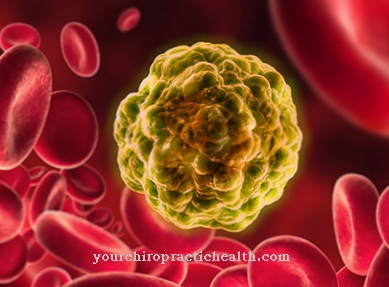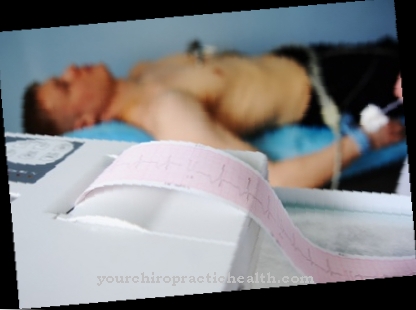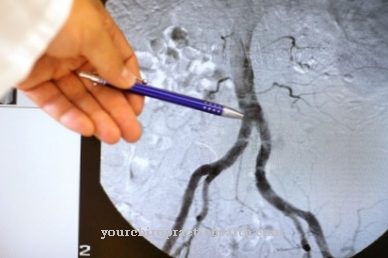One of the most common sexually transmitted diseases is gonorrhea or. Gonorrhea. This leads to various complaints in the area of the genital organs. Due to the increasingly popular oral sex today, the pathogens can also quickly spread to the mouth and throat. The typical symptoms of gonorrhea are also very common in the anal area.
What is gonorrhea (gonorrhea)?
What used to be a protracted and sometimes even fatal disease is now considered to be entirely curable: the so-called. gonorrhea or the gonorrhea. Triggered by a tiny bacterium, which belongs to the so-called "gram-negative cocci", this disease can take very different courses - from symptomless to extremely complex.
Neisseria gonorrhoeae, as the pathogen is called, is named after Albert Neisser, who first discovered this germ in a urethral swab in 1879. Tripper occurs worldwide and only affects humans. The infection was cured for the first time in 1944 with the invention of penicillin. In the meantime, however, the germ rarely responds to treatment with the former all-purpose weapon penicillin. Experts speak of "resistance" here. Fortunately, there are a few alternative medications and combinations that can be effective in combating gonorrhea.
causes
Gonorrhea (gonorrhea) is mainly transmitted sexually. It hardly matters whether the intercourse is vaginal, anal or oral. However, transmissions from the throat with gonorrhea are less common. The aggressive pathogen can sometimes cause severe eye infections by touching the eyes with the hands. An infection with gonorrhea causes urethritis in men with itching and discharge. Without antibiotic treatment, the symptoms often only subside after 2 months.
In women, a complication of the fallopian tubes sticking together is feared by the pathogen, which, if left untreated, leads to infertility. But there is a particularly great danger for developing life. During the first three months of pregnancy, the bacterium can ascend into the uterus and trigger the loss of the fetus. Later the embryo is protected because a plug of mucus closes the cervix.
A dreaded complication is the eye infection of the newborn with gonorrhea, since the pathogen can get into the eyes through vaginal secretions and thus lead to blindness. Gonorrhea can be particularly dangerous if it gets into the bloodstream. Sepsis with clap bacteria is often severe and fatal. Mortality increases the longer the gonorrhea remains undetected and therefore untreated.
Symptoms, ailments & signs
Infection with the venereal disease gonorrhea does not always cause symptoms. Infection is often mild, especially in women. About half of them don't notice anything. They unknowingly pass the bacteria on. Symptoms vary by gender. The first symptoms appear after three to ten days.
Men usually complain of severe pain when urinating. They state that they secrete broken glass. If there is no treatment, the problems can develop into chronic prostate inflammation. The penis and foreskin are very red. A purulent, yellow-greenish discharge develops.
In the advanced stage, swelling and lower abdominal pain are also possible. Male carriers of the disease can pass on the pathogen during sexual contact. Anal intercourse leads to inflammation in the rectum; oral intercourse leads to a sore throat in the sexual partner. Female patients usually suffer from cervical infection.
This is accompanied by a purulent discharge. Like men, women sometimes suffer from painful urination. In extreme cases, the bacteria continue to spread and attack the fallopian tubes and ovaries. Fever and symptoms in the lower abdomen then accompany the disease. In a few cases, symptoms can also affect the entire body.Men and women then suffer from fever, joint inflammation and skin changes. The heart and brain can also be attacked.
Complications
If a gonorrhea is detected early enough, the chances are good that it will heal completely, but if it is not or inadequately treated, various complications can arise. A common complication is male or female infertility. It can also happen that the gonococci, the pathogen causing gonorrhea, spread through the bloodstream in the body and cause secondary diseases such as inflammation of the joints, tendinitis, conjunctivitis and iris inflammation of the eye, cardiac muscle inflammation or skin inflammation.
If a pregnant woman is infected with gonorrhea, the child can be infected with the pathogen at birth. In the infant, ulcers can then form, which infect the cornea of the eye and, in the worst case, lead to blindness. In rare cases, the pathogens can spread more intensely through the bloodstream and cause blood poisoning, which is known in technical jargon as gonococcal sepsis.
It primarily affects people with a general immune system deficiency, for example with AIDS or other infectious diseases. Other serious complications from gonococcal infection can include meningitis or inflammation of the lining of the heart.
When should you go to the doctor?
If you notice typical gonorrhea symptoms such as a burning sensation when urinating, swelling or redness in the genital area or discharge from the urethra, a doctor is recommended. Symptoms in the throat indicate the spread of gonorrhea as a result of oral sex. Medical advice is required at the latest when fever or bleeding occurs. If left untreated, gonorrhea can develop into a chronic disease. As a result, there is a risk of infertility. If the symptoms appear immediately or some time after having unprotected sex, the problem may be gonorrhea.
Pregnant women and men who already suffer from a chronic disease of the prostate or epididymis should consult their doctor as soon as possible. The same applies to people who have a weakened immune system or cardiovascular disease due to another condition. Tripper is diagnosed and treated by a urologist or gynecologist. The doctor can diagnose the condition with a smear and a urine sample and take appropriate measures. If this happens early enough, possible consequences such as inflammation of internal organs, infertility and the like can be avoided. Therefore, a doctor should be consulted quickly if the symptoms mentioned occur and do not go away on their own within a few days.
Treatment & Therapy
Treatment of Gonorrhea (gonorrhea) is now done through highly effective antibiotics. Since the tried and tested penicillin has now become obsolete, the Robert Koch Institute recommends treatment with third generation cephalosporins in high doses (e.g. ceftriaxone). With the so-called flourquinolones, which were often used for therapy, many resistances have developed over time.
Testing of suitable antibiotics would be indicated here, including ofloxacin. It is carried out as a so-called "resistance test" in the medical laboratory. The complicated gonorrhea should be treated over a longer period of time. Since there is often an infection with clamydia and gonorrhea, the treating doctor must use combinations of antibiotics in this case. In addition to the cephalosporins, either doxycycline or azithromycin are suitable here.
In 2012 it became known that the gonorrhea pathogen Neisseria gonorrhoeae is already resistant to common broad spectrum antibiotics in some countries. Unless another antidote is developed in the near future, it would mean infected individuals would retain irreversible physical damage for life; for example in men the inability to conceive and in women infertility.
prevention
Contagion with gonorrhea can be effectively avoided by using condoms during sexual intercourse. If the condom is perceived as a foreign body, one should not constantly change sexual partners. If a partner is infected with gonorrhea, both must always be treated, otherwise the so-called "ping-pong" effect occurs, i.e. repeated re-infection with gonorrhea. The disease of the newborn with gonorrhea is now very well covered by the prophylaxis of pregnancy and therefore hardly occurs in the rich industrial nations any more.
Aftercare
Tripper disease (gonorrhea) requires early treatment. For effective follow-up care, it is important to include the partner in the therapy in order to prevent re-infection. Until the final test has taken place, those affected should refrain from sexual contact. Otherwise there is a risk that the pathogen could be transmitted to another person.
Typically, sufferers experience pain when urinating and notice a discharge. Daily hygiene is very important to reduce these discomforts. This helps to alleviate the symptoms. The doctor uses a PCR test to determine whether the therapy and follow-up treatment were successful. This generally takes place two weeks after the end of therapy.
If this control is positive for gonococci, it is necessary to have another test for culture and resistance carried out. Depending on the evaluation, a course of antibiotics may be necessary. Depending on how the antibiotic therapy goes, further tests may be required. During the follow-up treatment, it makes sense not only to suspend sexual activities. The entire organism needs a certain amount of protection, because the body's defenses are heavily used during recovery.
You can do that yourself
Self-treatment is not advisable for gonorrhea. Scientists agree that treatment with antibiotics is the only solution. However, there are more and more limits to be seen here as well. Because the pathogens have developed resistances. As a result, some therapies are prolonged until an effective drug combination has been found.
Patients can only support medical therapy. There are limits to self-help. Those affected refrain from any sexual contact until a test confirms healing. This prevents the pathogen from being transmitted to other people. Because one aspect must not be neglected: sexuality always has an impact on the life of the partner. Often both people suffer from an infection at the same time. They must then begin treatment together to prevent recurring mutual infections.
Major complaints of gonorrhea sufferers are pain when urinating and a discharge. Adequate daily hygiene can at least partially alleviate these signs. The use of condoms is advisable to prevent infection in everyday life. Chance acquaintances and one-night stands in particular hold the greatest risk for gonorrhea. Prevention is the best way to prevent infection.






-durch-vitamin-b12-mangel.jpg)

















.jpg)



